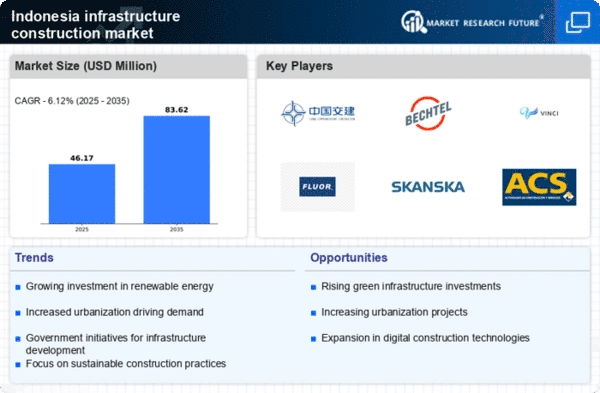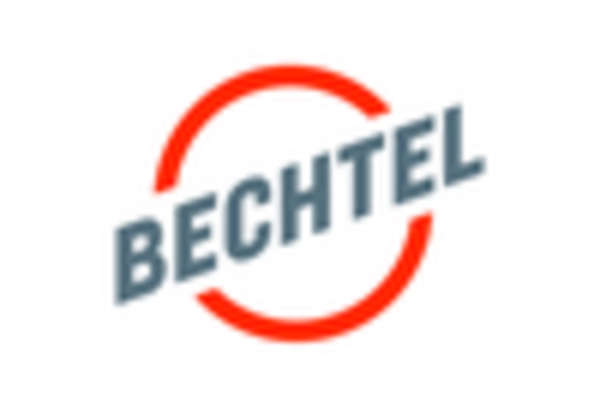The infrastructure construction market in Indonesia is characterized by a dynamic competitive landscape, driven by robust government initiatives aimed at enhancing national connectivity and urban development. Key players such as China Communications Construction Company (CN), Bechtel Corporation (US), and Vinci SA (FR) are actively engaged in various projects, leveraging their extensive experience and technological capabilities. These companies are strategically positioned to capitalize on the growing demand for infrastructure, focusing on innovation and regional expansion to enhance their market presence. Their collective strategies not only foster competition but also contribute to the overall growth of the sector, as they adapt to the evolving needs of the Indonesian market.In terms of business tactics, companies are increasingly localizing manufacturing and optimizing supply chains to improve efficiency and reduce costs. The market appears moderately fragmented, with several key players exerting influence over specific segments. This competitive structure allows for a diverse range of offerings, enabling companies to cater to various client needs while fostering innovation through competition.
In October China Communications Construction Company (CN) announced a significant partnership with the Indonesian government to develop a new high-speed rail project aimed at enhancing connectivity between major cities. This strategic move underscores the company's commitment to expanding its footprint in Indonesia while addressing the growing demand for efficient transportation solutions. The partnership is expected to leverage advanced construction technologies, potentially setting a new standard for infrastructure projects in the region.
In September Bechtel Corporation (US) secured a contract for the construction of a major toll road in Java, which is anticipated to alleviate traffic congestion and improve logistics. This project aligns with Bechtel's strategy of focusing on large-scale infrastructure developments that support economic growth. The company's ability to deliver complex projects on time and within budget is likely to enhance its reputation and competitive edge in the market.
In August Vinci SA (FR) launched a sustainability initiative aimed at reducing carbon emissions across its construction projects in Indonesia. This initiative reflects a growing trend towards environmentally responsible construction practices, which are becoming increasingly important to stakeholders. By prioritizing sustainability, Vinci positions itself as a leader in the market, appealing to clients who value eco-friendly solutions.
As of November the competitive trends in the infrastructure construction market are heavily influenced by digitalization, sustainability, and the integration of artificial intelligence. Strategic alliances among key players are shaping the landscape, fostering innovation and collaboration. The shift from price-based competition to a focus on technological advancement and supply chain reliability is evident, suggesting that companies that prioritize these aspects will likely achieve a competitive advantage in the evolving market.
















